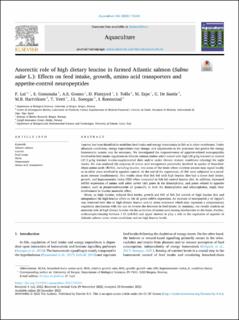| dc.description.abstract | Leucine has been identified to modulate feed intake and energy homeostasis in fish as in other vertebrates. Under allostatic conditions, energy expenditure may change, and adjustments to the processes that govern the energy homeostatic system may be necessary. We investigated the responsiveness of appetite-related neuropeptides involved in feed intake regulation in Atlantic salmon (Salmo salar) reared with high (35 g/kg leucine) or control (27.3 g/kg leucine) leucine-supplemented diets and/or under chronic stressor conditions (chasing) for eight weeks. We also analysed the response of amino acid transporters potentially involved in uptake of branched-chain amino acids (BCAA), including leucine, into areas of the brain where nutrient sensors may signal locally or to other areas involved in appetite control. At the end of the experiment, all fish were subjected to a novel-acute stressor (confinement). Our results show that fish fed with high leucine diet had a lower feed intake, growth, and hepatosomatic index (HSI) when compared to fish fed control leucine diet. In addition, increased mRNA expression of amino acid solute carrier (slc) genes in the diencephalon, and genes related to appetite control, such as proopiomelanocortin a1 (pomca1), in both the diencephalon and telencephalon, imply their involvement in leucine anorectic effect.
Stress, as high leucine, reduced feed intake, growth and HSI of fish fed control or high leucine diet and antagonized the high leucine effect on the slc genes mRNA expression. An increase of neuropeptide y a1 (npya1) was observed both due to high dietary leucine and/or stress treatment which may represent a compensatory regulatory mechanism with the aim to reverse the decrease in feed intake. In summary, our results confirm an anorectic role of high dietary leucine via the activation of amino acid sensing mechanisms in the brain. Further, corticotropin-releasing hormone 1 b1 (crh1b1) and npya1 showed to play a role in the regulation of appetite in Atlantic salmon under stress conditions and/or high leucine levels. | en_US |
